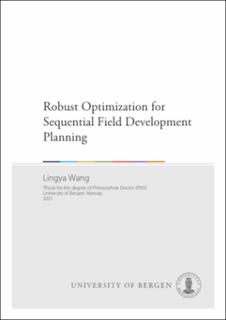| dc.contributor.author | Wang, Lingya | |
| dc.date.accessioned | 2021-09-15T07:51:20Z | |
| dc.date.available | 2021-09-15T07:51:20Z | |
| dc.date.issued | 2021-09-24 | |
| dc.date.submitted | 2021-08-19T11:34:48.724Z | |
| dc.identifier | container/58/2e/31/79/582e3179-95e3-4e71-9c92-daaaa7e0bac2 | |
| dc.identifier.isbn | 9788230849675 | |
| dc.identifier.isbn | 9788230869666 | |
| dc.identifier.uri | https://hdl.handle.net/11250/2777313 | |
| dc.description.abstract | To achieve high profitability from an oil field, optimizing the field development strategy (e.g., well type, well placement, drilling schedule) before committing to a decision is critically important. The profitability at a given control setting is predicted by running a reservoir simulation model, while determining a robust optimal strategy generally requires many expensive simulations. In this work, we focus on developing practical and efficient methodologies to solving reservoir optimization problems for which the actions that can be controlled are discrete and sequential (e.g., drilling sequence of wells).
The type of optimization problems I address must take into account both geological uncertainty and the reduction in uncertainty resulting from observations. As the actions are discrete and sequential, the process can be characterized as sequential decision- making under uncertainty, where past decisions may affect both the possibility of the future choices of actions and the possibility of future uncertainty reduction. This thesis tackles the challenges in sequential optimization by considering three main issues: 1) optimizing discrete-control variables, 2) dealing with geological uncertainty in robust optimization, and 3) accounting for future learning when making optimal decisions.
As the first contribution of this work, we develop a practical online-learning method- ology derived from A* search for solving reservoir optimization problems with discrete sets of actions. Sequential decision making can be formulated as finding the path with the maximum reward in a decision tree. To efficiently compute an optimal or near- optimal path, heuristics from relaxed problems are first used to estimate the maximum value constrained to past decisions, and then online-learning techniques are applied to improve the estimation accuracy by learning the errors of the initial approximations ob- tained from previous decision steps. In this way, an accurate estimate of the maximized value can be inexpensively obtained, thereby guiding the search toward the optimal so- lution efficiently. This approach allows for optimization of either a complete strategy with all available actions taken sequentially or only the first few actions at a reduced cost by limiting the search depth.
The second contribution is related to robust optimization when an ensemble of reservoir models is used to characterize geological uncertainty. Instead of computing the expectation of an objective function using ensemble-based average value, we develop various bias-correction methods applied to the reservoir mean model to estimate the expected value efficiently without sacrificing accuracy. The key point of this approach is that the bias between the objective-function value obtained from the mean model and the average objective-function value over an ensemble can be corrected by only using information from distinct controls and model realizations. During the optimization process, we only require simulations of the mean model to estimate the expected value using the bias-corrected mean model. This methodology can significantly improve the efficiency of robust optimization and allows for fairly general optimization methods.
In the last contribution of this thesis, we address the problem of making optimal decisions while considering the possibility of learning through future actions, i.e., op- portunities to improve the optimal strategy resulting from future uncertainty reduction. To efficiently account for the impact of future information on optimal decisions, we sim- plify the value of information analysis through key information that would help make better future decisions and the key actions that would result in obtaining that informa- tion. In other words, we focus on the use of key observations to reduce the uncertainty in key reservoir features for optimization problems, rather than using all observations to reduce all uncertainties. Moreover, by using supervised-learning algorithms, we can identify the optimal observation subset for key uncertainty reduction automatically and evaluate the information’s reliability simultaneously. This allows direct computation of the posterior probability distribution of key uncertainty based on Bayes’ rule, avoiding the necessity of expensive data assimilation algorithms to update the entire reservoir mode | en_US |
| dc.language.iso | eng | en_US |
| dc.publisher | The University of Bergen | en_US |
| dc.relation.haspart | Paper A: Wang, L. and Oliver, D.S., 2019, Efficient Optimization of Well-Drilling Sequence with Learned Heuristics, SPE Journal, 24(5), 2111-2134. The article is not available in BORA due to publisher restrictions. The published version is available at: <a href=" https://doi.org/10.2118/195640-PA" target="blank">https://doi.org/10.2118/195640-PA</a> | en_US |
| dc.relation.haspart | Paper B: Wang, L. and Oliver, D.S., 2021, Fast Robust Optimization Using Bias Correction Applied to the Mean Model, Computational Geosciences, 25, 475–501. The article is available at: <a href="https://hdl.handle.net/11250/2766859" target="blank">https://hdl.handle.net/11250/2766859</a> | en_US |
| dc.relation.haspart | Paper C: Wang, L. and Oliver, D.S., 2021, Improving Sequential Decisions – Efficiently Accounting for Future Learning, Journal of Petroleum Science and Engineering, 205, 108770. The article is available at: <a href="https://hdl.handle.net/11250/2777312" target="blank">https://hdl.handle.net/11250/2777312</a> | en_US |
| dc.rights | In copyright | |
| dc.rights.uri | http://rightsstatements.org/page/InC/1.0/ | |
| dc.title | Robust Optimization for Sequential Field Development Planning | en_US |
| dc.type | Doctoral thesis | en_US |
| dc.date.updated | 2021-08-19T11:34:48.724Z | |
| dc.rights.holder | Copyright the Author. All rights reserved | en_US |
| dc.description.degree | Doktorgradsavhandling | |
| fs.unitcode | 12-11-0 | |
